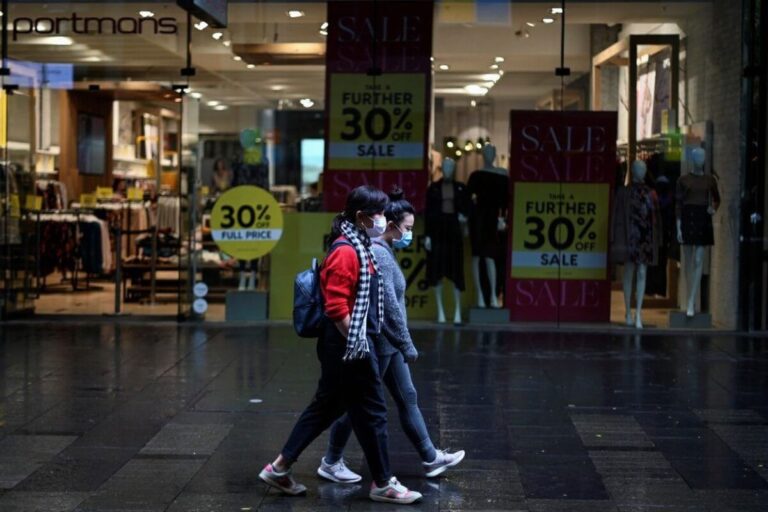
Chinese international students have made up the bulk of Australia’s higher education student population in recent years.
Data from Statista shows that there were over two million Chinese students in Australia in 2019, with approximately 1.7 million of them enrolled at colleges and universities.
When COVID-19 hit China in early January this year, lockdowns and travel restrictions prevented the majority of them from heading back to Australia as many were home for the Chinese New Year holiday.
The ensuing lockdown and international travel ban in Australia further prevented Chinese students from entering the country.
Just as Australia begins to ease lockdowns as the number of COVID-19 cases drops, a growing political conflict in recent months between the two countries has recently culminated in a travel warning issued by the Chinese government.
 Giraffes are seen at Toronga Zoo as it re-opens for business in Sydney on June 1, 2020. Social distancing regulations eased across Australia on June 1 with restaurants, pubs and cafes in New South Wales being allowed up to 50 patrons if social distancing is possible.
Giraffes are seen at Toronga Zoo as it re-opens for business in Sydney on June 1, 2020. Social distancing regulations eased across Australia on June 1 with restaurants, pubs and cafes in New South Wales being allowed up to 50 patrons if social distancing is possible.
Peter Parks/AFP
According to the statement by the Ministry of Education of the People’s Republic of China, “The spread of the new global Covid-19 outbreak has not been effectively controlled, and there are risks in international travel and open campuses. During the epidemic, there were multiple discriminatory incidents against Asians in Australia.”
“The Ministry of Education reminds all overseas students to do a risk assessment and is currently cautious in choosing to study in Australia or return to Australia.”
Despite this warning, government ministers and university officials in Australia are speaking publicly, saying that the war of words between the two nations is “unhelpful.” They told international students this should not be a deterrent for those from China seeking a world-class education in Australia.
So what should Chinese students who plan to study in Australia be aware of in 2020?
Australis is a safe and welcoming country
Education Minister Dan Tehan has rejected the notion that Australia is unsafe for international students from China.
He said, “Australia is a popular destination for international students because we are a successful, multicultural society that welcomes international students and provides world-class education.”
“Our success at flattening the [coronavirus] curve means we are one of the safest countries in the world for international students to be based in right now.”
Group of Eight chief executive Vicki Thomson also strongly objected to the claims and told ABC News that statements such as the one issued by the Ministry of Education in China are ” very disappointing and unjustified” and “raises some level of concern”.
“We have asked the Chinese embassy are there incidents that they are aware of that we need to know about because if there are we need to be working together to resolve them. They have been unable to provide us with that advice because they advise us there are no cases.
“So it is concerning that, yet again, international education, and particularly with China, is yet again the pawn in a political game that is not of our making.”
While racist incidents have occurred in the past, Chinese students currently in Australia say it’s few and far in between.
Michelle Ren based in Hobart told ABC News, “It’s not common, it’s very few people who do that and very few who experience that.”
She also said that friends and family back home are worried and the relationship between China and Australia may negatively affect students thinking about coming here.
Sydney University student Yu Yan told ABC News that she has heard of racist incidents but also has not been affected personally.
“Discrimination towards Asians in Australia has always existed, this time it gives them an ‘excuse’,” she said.
 Hand santiser and a list of rules await patrons at the Workers Club pub in Melbourne on June 1, 2020, as a lifting of lockdown laws saw pubs in the Australian state of Victoria open for the first time with limit of 20 people who are required to order a meal with their beer.
Hand santiser and a list of rules await patrons at the Workers Club pub in Melbourne on June 1, 2020, as a lifting of lockdown laws saw pubs in the Australian state of Victoria open for the first time with limit of 20 people who are required to order a meal with their beer.
Source: William West
Australia borders may be opening as early as July for Chinese students
The pandemic has caused so much disruption to higher education as universities scrambled to transition to online learning.
The recent announcement that Australia’s borders may be opening soon for international students – as early as July – comes as a welcome relief to many.
Under a three-step exit plan announced by Prime Minister Scott Morrisson, international students may be allowed back in during the third step subject to quarantine rules.
Face-to-face lectures may not fully resume due to social distancing but students will likely be able to engage in face-to-face tutorials in smaller groups.
CEO Catriona Jackson said, “We welcome the inclusion of international student travel down the track, in step three [of exit plan].”
“We are keen to welcome all our students, from home and abroad, back to face-to-face teaching, but when it is safe to do so.”
Liked this? Then you’ll love…
How regional Australian universities plan to be the first to bring international students back
Stuck in Australia during COVID-19? Extend your stay with this new visa option







